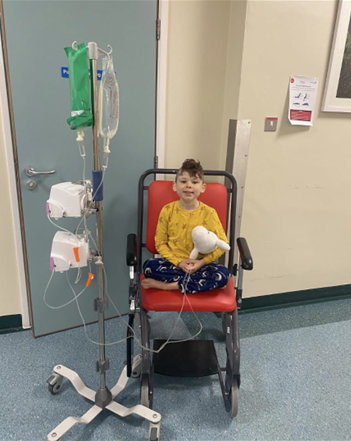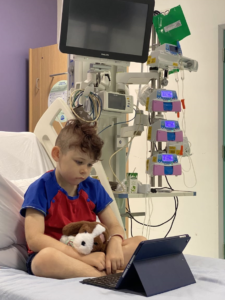I could hear the beeping in my sleep, even when there was no actual beeping.

In 2021 a 6 years old boy, called Olcán, was diagnosed with aplastic anaemia, a rare but serious blood disorder. Awaiting a bone marrow transplant, he spent 3 to 4 days in the hospital for transfusions. After his transplant in 2022, Olcán and his mother spent 184 nights in two hospitals over a 1.5 year period at various departments. He is doing well now as a post-transplant patient, but the hospital stay had an huge impact on him and his mother, especially the noise of medical alarms. Olcán’s mother wrote down her experiences in a diary and we interviewed her. Learn more about her perspective as a parent on her son’s ‘journey’ and discover the impact of alarms in this case.
Disease progression
“In 2021 Olcán presented with some unusual bruising. He had a blood test and got rushed into hospital the same day with very low haemoglobin and a platelet count of 2 x 109/L. An urgent transfusion was performed, and he was taken into surgery for a bone marrow aspirate to investigated suspected leukaemia. When we got the results the next day, it was not leukaemia, but they did not know what it was. Ten days later, he was rushed into surgery again following worsening of symptoms, haemorrhaging in his eyes and a rash covering his body.
Olcán was diagnosed with aplastic anaemia in August 2021, also known as bone marrow failure. This is rare in the age group of 12 to 18 years olds but extremely rare in children as young as Olcán who was only 6 years old at the time. After many tests, it was concluded that his aplastic anaemia was acquired rather than hereditary and that the initial cause was most likely asymptomatic Covid19 infection.
The cure for aplastic anaemia is a bone marrow transplant, but there was no match on the register, so he started immunotherapy in October. In January 2022 we found a match for a bone marrow donor and on 31st March 2022 he had his transplant. Olcán is now a 2 years post-transplant and doing exceptionally well.”
Long-term hospital stay
“Initially, we spent 3 to 4 days per week in hospital for transfusions. This included lots of overnight stays as every time he got an infection, we would have to stay in. After the transplant we started to have very lengthy stays in hospital, over an 18-month period we spent 184 nights in hospital. This was across two hospitals; the initial diagnosis was in Northern Ireland and then we moved back to England for the transplant. We pretty much visited every department, the transplant ward, high dependency unit, haematology, all over the hospital.”
I know all the pump alarms off by heart.
Experience of beeping alarms
“Even as an outpatient coming into have a transfusion there were lots of alarms from just the one pump. I know all of the pump alarms off by heart. The beep to tell you they’ve finished, they beep for occlusion, they beep to tell you the flush is nearly finished. It’s a lot of beeps! At one-point Olcán was hooked up to five pumps, they make the most obnoxious noise! I could hear the beeping in my sleep, even when there was no actual beeping.”
Impact of alarms on sleep quality

“I remember one night Olcán was on a patient monitor and multiple pumps. The nursing team had been coming in to silence the alarms, but there were still so many alarms going off. It was 3am and I was at breaking point, the sleep deprivation was awful. On average, I would get 2 hours of sleep before being woken by alarms. But some days I just didn’t get any sleep. Over one three day period, I got 40 minutes of sleep in total, just because of alarms. Sometimes Olcán did not get any sleep at all through the night either, especially for some infusions where the medication was prone to air bubbles. We would have constant alarms.”
Increased stress level
“The alarm noise increased my stress level as a parent and I think the alarms impacted me more than it impacted my son Olcán. There could be multiple alarms going off and they would go for as long as 10 minutes before being cleared, that was difficult for me as a parent. When his oxygen levels were low, that alarm was really stressful, because it wasn’t like a pump where I could see the issue, it was an unknown cause.”
Time & resources savings
“I feel that a quieter environment with fewer alarms would have made so much difference to me and Olcán. I spent some of my time formulating a plan to build an app that would get the alarms out of the room.
I also saw so many opportunities to improve alarms and practices around alarms during our time in hospital. When we were on the transplant ward, we were in a special room with an airlock and nurses would have to put full person protective equipment on to come into the room. Therefore, to silence an alarm, there was so much waste and inefficiency. Nurses could come in and out of the room up to 15 times for alarms on one infusion. I think it would be more efficient to have the alarms outside of the room, to give nurses the ability to see what the alarm is for before coming into the room would save so much time and resources.
So when I heard what itemedical is doing by reducing irrelevant alarms with its medical software and create a quieter care environment, I was very happy.”
Longing for a safe and calmer care department with fewer medical alarms?
Discover our vendor neutral intelligent medical alarm solution